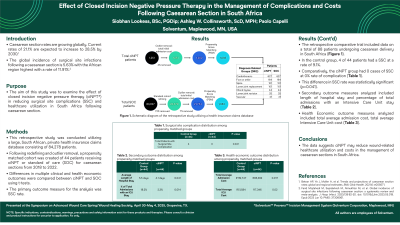Clinical Research
(CR-041) Effect of Closed Incision Negative Pressure Therapy in the Management of Complications and Costs Following Caesarean Section in South Africa
Friday, May 2, 2025
7:45 PM - 8:45 PM East Coast USA Time

Ashley Collinsworth, ScDMPH – Senior Research Scientist, HEOR, Solventum MedSurg
Introduction: Caeserean section (CS) rates are growing globally. Current rates of 21.5% are expected to increase to 28.5% by 2030.1 The global incidence of surgical site infections (SSI) following a CS is 5.6% with the African region highest with a rate of 11.91%.2
This study aimed to examine the effect of closed incision negative pressure therapy (ciNPT*) in reducing surgical site complications and healthcare utilization in South Africa following CS.
Methods: This retrospective study was conducted utilizing a large, South African, private health insurance claims database. A propensity matched cohort of 44 patients receiving ciNPT or standard of care (SOC) for CS from 2018-2022 was created. Differences in multiple clinical and health economic outcomes were compared between ciNPT and SOC using t tests.
Results: The overall surgical site complication (SSC) rate in the ciNPT group was lower at 0 cases (0.0%) compared to 4 cases (9.1%) in the SOC group (p=0.041). The average length of hospital stay was lower in the ciNPT group vs. SOC (4.1 vs. 5.5 days, p=0.008) resulting in significantly lower average admission cost ciNPT vs. SOC (R85,392 vs. R119,747, p=0.017). The percentage of total admissions with an intensive care unit (ICU) stay was lower in the ciNPT group vs. SOC (2.3% vs. 18.2%, p=0.014) resulting in a reduction in average ICU admission cost for the ciNPT group vs. SOC (R7,346 vs. R51,584, p=0.02).
Discussion: The data suggests ciNPT may reduce wound-related healthcare utilization and costs in the management of caesarean sections in South Africa.
This study aimed to examine the effect of closed incision negative pressure therapy (ciNPT*) in reducing surgical site complications and healthcare utilization in South Africa following CS.
Methods: This retrospective study was conducted utilizing a large, South African, private health insurance claims database. A propensity matched cohort of 44 patients receiving ciNPT or standard of care (SOC) for CS from 2018-2022 was created. Differences in multiple clinical and health economic outcomes were compared between ciNPT and SOC using t tests.
Results: The overall surgical site complication (SSC) rate in the ciNPT group was lower at 0 cases (0.0%) compared to 4 cases (9.1%) in the SOC group (p=0.041). The average length of hospital stay was lower in the ciNPT group vs. SOC (4.1 vs. 5.5 days, p=0.008) resulting in significantly lower average admission cost ciNPT vs. SOC (R85,392 vs. R119,747, p=0.017). The percentage of total admissions with an intensive care unit (ICU) stay was lower in the ciNPT group vs. SOC (2.3% vs. 18.2%, p=0.014) resulting in a reduction in average ICU admission cost for the ciNPT group vs. SOC (R7,346 vs. R51,584, p=0.02).
Discussion: The data suggests ciNPT may reduce wound-related healthcare utilization and costs in the management of caesarean sections in South Africa.

.jpg)
